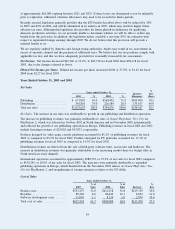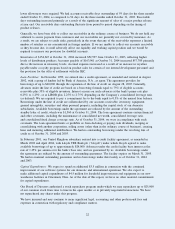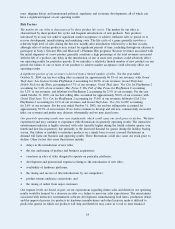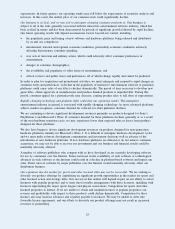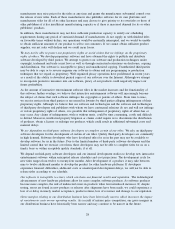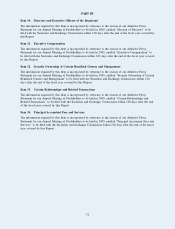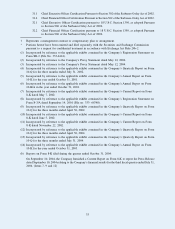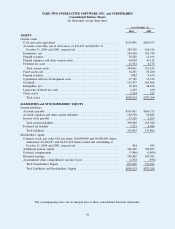2K Sports 2004 Annual Report Download - page 36
Download and view the complete annual report
Please find page 36 of the 2004 2K Sports annual report below. You can navigate through the pages in the report by either clicking on the pages listed below, or by using the keyword search tool below to find specific information within the annual report.
manufacturer may raise prices for the titles at any time and grants the manufacturer substantial control over
the release of new titles. Each of these manufacturers also publishes software for its own platforms and
manufactures titles for all of its other licensees and may choose to give priority to its own titles or those of
other publishers if it has insufficient manufacturing capacity or if there is increased demand for its or other
publishers’ products.
In addition, these manufacturers may not have sufficient production capacity to satisfy our scheduling
requirements during any period of sustained demand. If manufacturers do not supply us with finished titles
on favorable terms without delays, our operations would be materially interrupted, and we would be unable
to obtain sufficient amounts of our product to sell to our customers. If we cannot obtain sufficient product
supplies, our net sales will decline and we could incur losses.
We may not be able to protect our proprietary rights or avoid claims that we infringe on the proprietary
rights of others. We develop proprietary software and have obtained the rights to publish and distribute
software developed by third parties. We attempt to protect our software and production techniques under
copyright, trademark and trade secret laws as well as through contractual restrictions on disclosure, copying
and distribution. Our software is susceptible to piracy and unauthorized copying. Unauthorized third parties
may be able to copy or to reverse engineer our software to obtain and use programming or production
techniques that we regard as proprietary. Well organized piracy operations have proliferated in recent years
as a result of the ability to download pirated copies of our software over the Internet. Although we attempt
to incorporate protective measures into our software, piracy of our products could negatively impact our
future profitability.
As the amount of interactive entertainment software titles in the market increases and the functionality of
this software further overlaps, we believe that interactive entertainment software will increasingly become
the subject of claims that such software infringes the copyrights or patents of others. From time to time,
we receive notices from third parties or are named in lawsuits by third parties alleging infringement of their
proprietary rights. Although we believe that our software and technologies and the software and technologies
of third-party developers and publishers with whom we have contractual relations do not and will not infringe
or violate proprietary rights of others, it is possible that infringement of proprietary rights of others has or
may occur. Any claims of infringement, with or without merit, could be time consuming, costly and difficult
to defend. Moreover, intellectual property litigation or claims could require us to discontinue the distribution
of products, obtain a license or redesign our products, which could result in additional substantial costs and
material delays.
We are dependent on third-party software developers to complete certain of our titles. We rely on third-party
software developers for the development of certain of our titles. Quality third-party developers are continually
in high demand. Software developers who have developed titles for us in the past may not be available to
develop software for us in the future. Due to the limited number of third-party software developers and the
limited control that we exercise over them, these developers may not be able to complete titles for us on a
timely basis or within acceptable quality standards, if at all.
We depend on third-party software developers and our internal development studios to develop new interactive
entertainment software within anticipated release schedules and cost projections. The development cycle for
new titles ranges from twelve to twenty-four months. After development of a product, it may take between
nine to twelve additional months to develop the product for other hardware platforms. If developers
experience financial difficulties, additional costs or unanticipated development delays, we will not be able to
release titles according to our schedule.
Our software is susceptible to errors, which can harm our financial results and reputation. The technological
advancements of new hardware platforms allow for more complex software products. As software products
become more complex, the risk of undetected errors in products when first introduced increases. If, despite
testing, errors are found in new products or releases after shipments have been made, we could experience a
loss of or delay in timely market acceptance, product returns, loss of revenues and damage to our reputation.
Gross margins relating to our distribution business have been historically narrow which increases the impact
of variations in costs on our operating results. As a result of intense price competition, our gross margins in
our distribution business have historically been narrow and may continue to be narrow in the future.
28



